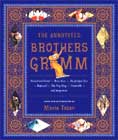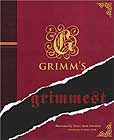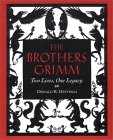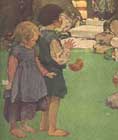

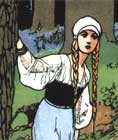
Author's Notes
translated by Margaret Hunt
Return
to
Household Tales:
Table of Contents
SurLaLune Fairy Tales Main Page
The
Six Swans
Don't
miss SurLaLune's annotated version of the tale at:
The Six Swans
ONCE upon a time, a certain King was
hunting in a great forest, and he chased a wild beast so eagerly that
none of his attendants could follow him. When evening drew near he stopped
and looked around him, and then he saw that he had lost his way. He sought
a way out, but could find none. Then he perceived an aged woman with a
head which nodded perpetually, who came towards him, but she was a witch.
"Good woman," said he to her, "Can you not show me the
way through the forest?" "Oh, yes, Lord King," she answered,
"that I certainly can, but on one condition, and if you do not fulfil
that, you will never get out of the forest, and will die of hunger in
it."
"What kind of condition is it?" asked the King.
"I have a daughter," said the old woman, "who is as beautiful as any one in the world, and well deserves to be your consort, and if you will make her your Queen, I will show you the way out of the forest." In the anguish of his heart the King consented, and the old woman led him to her little hut, where her daughter was sitting by the fire. She received the King as if she had been expecting him, and he saw that she was very beautiful, but still she did not please him, and he could not look at her without secret horror. After he had taken the maiden up on his horse, the old woman showed him the way, and the King reached his royal palace again, where the wedding was celebrated.
The King had already been married once, and had by his first wife, seven children, six boys and a girl, whom he loved better than anything else in the world. As he now feared that the step-mother might not treat them well, and even do them some injury, he took them to a lonely castle which stood in the midst of a forest. It lay so concealed, and the way was so difficult to find that he himself would not have found it, if a wise woman had not given him a ball of yarn with wonderful properties. When he threw it down before him, it unrolled itself and showed him his path. The King, however, went so frequently away to his dear children that the Queen observed his absence; she was curious and wanted to know what he did when he was quite alone in the forest. She gave a great deal of money to his servants, and they betrayed the secret to her, and told her likewise of the ball which alone could point out the way. And now she knew no rest until she had learnt where the King kept the ball of yarn, and then she made little shirts of white silk, and as she had learnt the art of witchcraft from her mother, she sewed a charm inside them. And once when the King had ridden forth to hunt, she took the little shirts and went into the forest, and the ball showed her the way. The children, who saw from a distance that some one was approaching, thought that their dear father was coming to them, and full of joy, ran to meet him. Then she threw one of the little shirts over each of them, and no sooner had the shirts touched their bodies than they were changed into swans, and flew away over the forest. The Queen went home quite delighted, and thought she had got rid of her step-children, but the girl had not run out with her brothers, and the Queen knew nothing about her. Next day the King went to visit his children, but he found no one but the little girl. "Where are thy brothers?' asked the King. "Alas, dear father," she answered, "they have gone away and left me alone!" and she told him that she had seen from her little window how her brothers had flown away over the forest in the shape of swans, and she showed him the feathers, which they had let fall in the courtyard, and which she had picked up. The King mourned, but he did not think that the Queen had done this wicked deed, and as he feared that the girl would also be stolen away from him, he wanted to take her away with him. But she was afraid of her step-mother, and entreated the King to let her stay just this one night more in the forest castle.
The poor girl thought, "I can no longer stay here. I will go and seek my brothers." And when night came, she ran away, and went straight into the forest. She walked the whole night long, and next day also without stopping, until she could go no farther for weariness. Then she saw a forest-hut, and went into it, and found a room with six little beds, but she did not venture to get into one of them, but crept under one, and lay down on the hard ground, intending to pass the night there. Just before sunset, however, she heard a rustling, and saw six swans come flying in at the window. They alighted on the ground and blew at each other, and blew all the feathers off, and their swan's skins stripped off like a shirt. Then the maiden looked at them and recognized her brothers, was glad and crept forth from beneath the bed. The brothers were not less delighted to see their little sister, but their joy was of short duration. "Here canst thou not abide," they said to her. "This is a shelter for robbers, if they come home and find thee, they will kill thee." "But can you not protect me?" asked the little sister. "No," they replied, "only for one quarter of an hour each evening can we lay aside our swan's skins and have during that time our human form; after that, we are once more turned into swans." The little sister wept and said, "Can you not be set free?" "Alas, no," they answered, "the conditions are too hard! For six years thou mayst neither speak nor laugh, and in that time thou must sew together six little shirts of starwort for us. And if one single word falls from thy lips, all thy work will be lost." And when the brothers had said this, the quarter of an hour was over, and they flew out of the window again as swans.
The maiden, however, firmly resolved to deliver her brothers, even if it should cost her her life. She left the hut, went into the midst of the forest, seated herself on a tree, and there passed the night. Next morning she went out and gathered starwort and began to sew. She could not speak to any one, and she had no inclination to laugh; she sat there and looked at nothing but her work. When she had already spent a long time there it came to pass that the King of the country was hunting in the forest, and his huntsmen came to the tree on which the maiden was sitting. They called to her and said, "Who art thou?" But she made no answer. "Come down to us," said they. "We will not do thee any harm." She only shook her head. As they pressed her further with questions she threw her golden necklace down to them, and thought to content them thus. They, however, did not cease, and then she threw her girdle down to them, and as this also was to no purpose, her garters, and by degrees everything that she had on that she could do without until she had nothing left but her shift. The huntsmen, however, did not let themselves be turned aside by that, but climbed the tree and fetched the maiden down and led her before the King. The King asked, "Who art thou? What art thou doing on the tree?" But she did not answer. He put the question in every language that he knew, but she remained as mute as a fish. As she was so beautiful, the King's heart was touched, and he was smitten with a great love for her. He put his mantle on her, took her before him on his horse, and carried her to his castle. Then he caused her to be dressed in rich garments, and she shone in her beauty like bright daylight, but no word could be drawn from her. He placed her by his side at table, and her modest bearing and courtesy pleased him so much that he said, "She is the one whom I wish to marry, and no other woman in the world." And after some days he united himself to her.
The King, however, had a wicked mother who was dissatisfied with this marriage and spoke ill of the young Queen. "Who knows," said she, "from whence the creature who can't speak, comes? She is not worthy of a king!" After a year had passed, when the Queen brought her first child into the world, the old woman took it away from her, and smeared her mouth with blood as she slept. Then she went to the King and accused the Queen of being a man-eater. The King would not believe it, and would not suffer any one to do her any injury. She, however, sat continually sewing at the shirts, and cared for nothing else. The next time, when she again bore a beautiful boy, the false step-mother used the same treachery, but the King could not bring himself to give credit to her words. He said, "She is too pious and good to do anything of that kind; if she were not dumb, and could defend herself, her innocence would come to light." But when the old woman stole away the newly-born child for the third time, and accused the Queen, who did not utter one word of defence, the King could do no otherwise than deliver her over to justice, and she was sentenced to suffer death by fire.
When the day came for the sentence to be executed, it
was the last day of the six years during which she was not to speak or
laugh, and she had delivered her dear brothers from the power of the enchantment.
The six shirts were ready, only the left sleeve of the sixth was wanting.
When, therefore, she was led to the stake, she laid the shirts on her
arm, and when she stood on high and the fire was just going to be lighted,
she looked around and six swans came flying through the air towards her.
Then she saw that her deliverance was near, and her heart leapt with joy.
The swans swept towards her and sank down so that she could throw the
shirts over them, and as they were touched by them, their swan's skins
fell off, and her brothers stood in their own bodily form before her,
and were vigorous and handsome. The youngest only lacked his left arm,
and had in the place of it a swan's wing on his shoulder. They embraced
and kissed each other, and the Queen went to the King, who was greatly
moved, and she began to speak and said, "Dearest husband, now I may
speak and declare to thee that I am innocent, and falsely accused."
And she told him of the treachery of the old woman who had taken away
her three children and hidden them. Then to the great joy of the King
they were brought thither, and as a punishment, the wicked step-mother
was bound to the stake, and burnt to ashes. But the King and the Queen
with their six brothers lived many years in happiness and peace.
Grimm, Jacob and Wilhelm. Household Tales. Margaret Hunt, translator. London: George Bell, 1884, 1892. 2 volumes.
Notes
From Hesse. It is connected with the story of the Seven Ravens (No. 25), only here we have six swans, because the children have been bewitched when perfectly innocent. Another story from German Bohemia links the two stories together. It agrees with the former up to the point where the sister went out into the world with a loaf of bread and a small pitcher of water to seek her brothers. Then it is related that she wandered on day after day for many a mile, and never found the least trace of them, but came at length to an ancient deserted castle, and thought that she might perhaps find something there. But no human being was to be seen in the castle, and yet she saw smoke ascending, and heard a fire crackling. "Where smoke is rising and fire burning, human beings must be living too," thought she, and went onwards. At last she reached a kitchen where seven pans were standing on the hearth, frothing and bubbling up, but no cook was there. "Eh, what is being cooked here?" said the girl, and peeped into the pans, and strange roots and herbs were inside them. "Flow good these must taste!" said she, and tasted a little bit out of each, and stirred them round thoroughly. She liked cooking, which she had not done for a long time, and the morsel of warm food did her good too, for it was long since she had tasted any. And now she heard a rustling in the air, and seven black ravens came whirring down through the chimney; each laid hold of his little pan and flew with it into the dining-room and began to eat his dinner. The first raven had just eaten a couple of mouthfuls when he said, "It is strange! There is rather less of my food than there ought to be, but it tastes as if it had been cooked by a human hand." "It is the same with mine!" said the second, "What if our little sister should be here?" "Ah!" said the third, "she is the cause of all our misery; we will pick her eyes out." "What had she to do with it?" said the fourth raven. The fifth said, "I would do nothing to hurt her." "She might perhaps be able to release us," said the sixth, and just as the seventh was crying, "God grant she may be here," she came in by the door of the room for she had been listening to the whole conversation, and could not find it in her heart to wait any longer, so great was her sorrow at seeing her dear brothers changed into such ugly birds. "Do with me even as you will," said she, "I am your sister with the golden cross; tell me if I can set you free." "Yes," said they, "thou canst still set us free, but it is very difficult." She said he was ready, and would gladly do anything, no matter what it was. Then the ravens said, "For seven long years thou must not say one word on pain of death, and during that time must sew for each of us a shirt and a handkerchief, and knit us a pair of stockings, which must not be ready either sooner or later, than the last day of the seven years. This time can, however, not be passed by thee here with us, for we might some time chance to do thee an injury, if the raven nature were to come upon us; or our companion ship might some time lead thee away to speak."
So they searched in the forest for a hollow tree for her, placed her inside it at the top that she might remain quiet and alone, pro cured for her as much flax as was needed, and spinning-gear, and from time to time carried her some food that she might not perish of hunger.
Thus passed one year, a second, and still another; and the good little sister sat still in the hollow tree, and only moved as much as was needful to do her spinning. Then it came to pass that the son of the King to whom the forest belonged, one day commanded a chase in the forest, and by mistake, a pack of hounds got through the briars and bushes to a part where no huntsman had ever been before, and went as far as the hollow tree. There they stood still, because they scented some living creature, and they snuffed and stood barking round about the tree. The hunters however followed the sound and came up, but at first could find no animal that the hounds could have tracked, because the girl sat so still -and never moved and she had been there such a length of time that moss had grown all over her, and she was almost like the tree. At length, however, they distinguished the shape of her body, and informed their master that a beast in human shape was sitting in a hollow tree, and neither moved nor uttered any sound. The Prince went up to it, and ordered them to take her out. She let them do as they liked, and never spoke. And when they began to remove the moss from her and to clean her, her white face appeared, and also the cross upon her forehead, so that the Prince was amazed at her beauty, and spoke to her in every language £hat he knew, that he might learn who she was and how she had got there. But she remained mute as a fish to all he said, so the Prince took her borne with him, gave her into the care of the women-in-waiting, and bade them wash and dress her, which was done, as he had commanded. But if she had been beautiful before, now she shone forth in her rich garments like the bright day, only no word ever passed her lips. Nevertheless, the Prince placed her by his side at table, and was so deeply touched by her appearance and gentle bearing, that in a very few days he wished to marry her, and would have no other on earth. His mother opposed this marriage most vehemently, and said that no one knew for certain whether she was a beast or a human being, for she neither spoke, nor wished to learn to do so, and such a marriage was nothing but a crime. But no talking did any good, the King said, "How can any one doubt that she is a human being? She has a form that is as beautiful as an angel's, and the cross upon her forehead bears witness to her noble origin?" So the marriage was solemnized with much splendour and rejoicing.
As the Prince's wife she lived modestly and industriously in her little chamber, working continually at her spinning-wheel to release her brothers from the curse which lay on them. After half a year, just when she was with child, the Prince had to go away to the wars, and he ordered his mother to take good care of his wife. But his mother was very glad of his absence, and when the hour of the Princess's delivery came, and she brought forth a most beautiful boy, with a cross on his brow like that which she had herself, the old woman gave the child to a servant and ordered him to carry it into the forest and murder it, and bring her its tongue as a token that the deed was done. She wrote a letter to the Prince, in which it was written that his wife, who must herself be looked on by every one as half-beast, had as was to be expected, been delivered of a dog which they had had drowned. Whereupon the Prince replied that she was nevertheless to be treated as his wife until he returned borne from the wars, and himself determined what was to be done. In the meantime the servant had gone into the forest with the little boy, and a lioness met him, and he threw the child down to her thinking she would devour it, and he would not need to kill it, hut the lioness licked it with her tongue. "If a raging wild beast can feel pity, I am still less able to behave with cruelty," thought the servant, and left the child with the lioness, and took back a dog's tongue to the old Queen. Soon after this the King returned home from the wars, and when he saw how beautiful his wife was, he could not but believe her innocent, nor could he make her undergo any punishment. Next year she was again expecting to have a child; and as the Prince was again on the point of going away, everything happened just as before: the child that was born was taken to the lioness, and was brought up by her. The aged Princess accused her much more violently, but again the Prince was convinced of her innocence, although she herself dared not utter one syllable in her own justification. But when for the third time all that had happened before occurred again, the Prince believed that he should fall under the displeasure of God if he continued to live any longer with a wife who brought beasts into the w instead of human heirs, so when he came home he commanded that she should be put to death by fire. Now the day of her execution was just the very last of the seven years, and as she was putting in the last stitch she sighed and thought, "Ah Heavens, can the weary time have come to an end!" In the selfsame moment her seven brothers were delivered from the spell, and changed from ravens to men again, and instantly leapt on seven ready-saddled horses, and galloped through the forest. In the midst of it they saw three little boys sitting beside a lioness, each with a golden cross on his forehead. "Those are the children of our dearest sister," said they, and took them up on their horses. When they were riding out of the forest they saw from afar a crowd of people standing, and the pile of wood burning. They made signals with their handkerchiefs, and rode on at a gallop. "Dearest sister, how art thou?" they cried. "Here are thy three children for thee." She was unbound, and as speech was once more permitted to her, she thanked God with a loud voice, and the wicked old woman was burnt to ashes in her stead. Here we see how our story is connected with that of the Seven Ravens (No. 25), and with that of The Twelve Brothers (No. 9), and how all three belong to the same group, as does a Bohemian story (see further on). In the Brunswick Collection, see pp. 349-379, The Seven Swans. In Kuhn, No 10. In Sommer, p. 142. In Meier, No. 7. In Asbjörnsen, p. 209. Compare Altdeutsche Blätter, 1. 128; and Leo's Beowulf, p. 25, and following. The story everywhere shows extreme antiquity, the seven men's shirts seem to be connected with the swan's shirts, which we know from the Völundarquida. In connection with this there is also the saga of the boat drawn by swans on the Rhine (Parcifal, Lohengrin, &c.), and the old French Chevalier au cigne, where also the last swan is not set free because the gold of its swan's ring is already used up. A ball which unrolls itself, and shows the way, is also to be found in the Russian ballad in Wladimir's Round Table, p. 115.
©Heidi
Anne Heiner, SurLaLune Fairy Tales
E-mail: surlalune@aol.com
Page last updated October 15, 2006
www.surlalunefairytales.com







